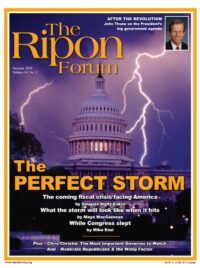 Perception is often reality in politics. Just ask George H.W. Bush. Twenty-three years ago this October, when he was beginning his campaign to succeed Ronald Reagan as President, Newsweek ran a cover story on him bearing this headline: “Fighting the Wimp Factor.”
Perception is often reality in politics. Just ask George H.W. Bush. Twenty-three years ago this October, when he was beginning his campaign to succeed Ronald Reagan as President, Newsweek ran a cover story on him bearing this headline: “Fighting the Wimp Factor.”
The gist of the story was that Bush didn’t have the backbone of Reagan. Of course, it was nonsense. Among other things, he was a highly decorated veteran; someone who was shot down over the Pacific during World War II. The closest Ronald Reagan ever got to combat was a Hollywood backlot. Yet somehow, the perception stuck that Bush was soft.
He spent much of the 1988 campaign trying to overcome this perception. He ate pork rinds, attended NASCAR events, and wrapped himself in the American flag. By the time the November general election rolled around, there was no question as to who the toughest candidate in the race was. It was George H.W. Bush. He was elected 41st President of the United States, and out went any further mention of his being a wimp.
Today in America, another group of politicians is facing questions related to their toughness. They are Republican moderates. Some call them RINOs – Republicans in Name Only. Others call them squishes. Whatever their name, the perception of them collectively is that they are soft; that they have no backbone; that when tough votes come down the pike, they head for the hills and let conservatives lead the fight.
Today in America, another group of politicians is facing questions related to their toughness. They are Republican moderates.
To be fair, this perception is not entirely accurate. Over the past 16 months, for example, moderates have been as unified as conservatives in their opposition to the Obama big government agenda. First, they held the line and voted as a bloc against the Administration’s stimulus plan. Then, they held the line and opposed the President’s health care reform plan. On both of these bills, moderate Republicans defied the perception that they lack resolve when it comes to fiscal discipline. Unfortunately, this type of spending restraint by moderates has often been the exception, not the rule.
The most recent BillTally report by the National Taxpayers Union bears that out. In this report, which is compiled annually by this nonpartisan watchdog organization, the NTU examined the cost or savings of all legislation introduced in the First Session of the 111th Congress that affected spending by at least $1 million. The NTU found that the average Republican in the House of Representatives was a “net cutter” – that is, they introduced legislation that resulted in less spending, not more. For the moderate Republican Main Street Partnership, however, the NTU found that just the opposite was true. Specifically, the NTU found that the typical Main Street member introduced legislation that increased spending by an average of $40.6 billion.
The NTU report is not that surprising. After all, moderates have always been more open to new spending than conservatives. But at a time when Republicans are debating the future of the party, the report should be of concern to anyone who wants moderates to have a bigger role in that debate. The reason is simple: the GOP is changing. Five years ago, the animating force that galvanized the party was its opposition to taxes and terrorism. While those issues are clearly still important, the issue that is galvanizing the party more than any other today – and the force that is driving the tea party – is spending, and the belief that our national debt is spiraling dangerously out of control. As a result of this new paradigm, this year’s BillTally report by the NTU should be a wake-up call for moderates, for it not only calls into question their commitment to the GOP’s top priority, but reinforces the perception that, when it comes to fiscal discipline, they are wimps.
To counter this perception, moderate Republicans need to find the fiscal equivalent of a pork rind – something that will let them demonstrate their fiscal resolve and commitment to reducing the national debt. There are no shortages of options in this regard.
To counter this perception, moderate Republicans need to find the fiscal equivalent of a pork rind – something that will let them demonstrate their fiscal resolve and commitment to reducing the national debt.
Some of these options are symbolic. For example, House Republican Whip Eric Cantor has established a website called YouCut that allows Americans to vote on where government spending can be reduced. In the eight weeks it has been online, YouCut has gotten over 1.6 million votes. To show their support of this effort, many House Republicans have posted a link to it on his or her own website. Of the 42 members of the Main Street Partnership, however, only seven have done such a thing. That should change. Every moderate Republican should link to this website and show their support for the YouCut effort.
Other options are more substantive. For instance, Texas Congressman Kevin Brady has introduced a bill that would essentially put an expiration date of 10 years on any new federal program. When the expiration date is reached, a nonpartisan review – or sunset – commission, or would assess whether the program was still performing the function it was originally intended to do. If the answer is no, the program would be abolished. If the answer is yes, the program would be reauthorized for another decade, at which time it would be reviewed again.
A version of this legislation was overwhelmingly approved by the Senate in 1978 by a vote of 87-1. The bill’s supporters at the time ranged from Republicans Barry Goldwater and Jesse Helms to Democrats George McGovern and Edward Kennedy. Today, the bill’s sponsors are primarily conservatives – only six moderates are currently signed onto the bill. That should change. If a liberal Democrat such as Ted Kennedy could back the idea 30 years ago, moderate Republicans can certainly support the idea today. Every moderate should cosponsor this bill.
If a liberal Democrat such as Ted Kennedy could back the [sunset commission bill] 30 years ago, moderate Republicans can certainly support the idea today.
One other idea that has been around for a while is the Balanced Budget Amendment. Republicans tried unsuccessfully to pass a BBA when they controlled Congress in the 1990s. Another effort has been launched to bring the issue up for debate again today. The conservative Democrat Blue Dog Coalition has formally endorsed the idea. While the Main Street Partnership has not followed suit and officially endorsed the proposal, 37 of the group’s 42 members have signed on as cosponsor of H.J. 1, the Balanced Budget Amendment bill.
This is a good start. But moderate Republicans can do better in demonstrating their fiscal resolve. They must do better. For if the GOP retakes the House next year, the party will need members who are ready to make difficult decisions regarding America’s fiscal future.
In short, the party – and the Nation – will need Republicans who are tough. The question for moderates is this:
Are they up to the challenge? RF
Lou Zickar is the Forum’s Editor.




